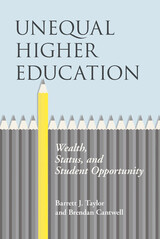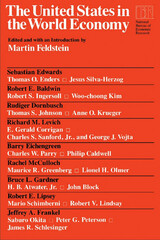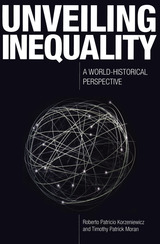118 books about Comparative and 3
start with U
118 books about Comparative and 3
118 books about Comparative
3 start with U start with U
3 start with U start with U

Unequal Higher Education
Wealth, Status, and Student Opportunity
Barrett J. Taylor
Rutgers University Press, 2019
American higher education is often understood as a vehicle for social advancement. However, the institutions at which students enroll differ widely from one another. Some enjoy tremendous endowment savings and/or collect resources via research, which then offsets the funds that students contribute. Other institutions rely heavily on student tuition payments. These schools may struggle to remain solvent, and their students often bear the lion’s share of educational costs. Unequal Higher Education identifies and explains the sources of stratification that differentiate colleges and universities in the United States. Barrett J. Taylor and Brendan Cantwell use quantitative analysis to map the contours of this system. They then explain the mechanisms that sustain it and illustrate the ways in which rising institutional inequality has limited individual opportunity, especially for students of color and low-income individuals.
[more]

The United States in the World Economy
Edited by Martin Feldstein
University of Chicago Press, 1988
The United States in the World Economy offers the results of a conference organized by the National Bureau of Economics in 1987. The volume includes background papers prepared by nine academic economists, personal statements by individuals prominent in government and business, and summaries of the discussion that followed the presentations. Among the topics considered are foreign competition in Latin America and the Asian Pacific Rim, Third World debts, innovations in international financial markets, changing patterns of international investment, international capital flows, and international competition in goods, services, and agriculture. Prepared for a sophisticated but non-technical audience, these papers present complicated economic issues clearly, indicating the many ways in which the American economy influences and is influenced by economic events and conditions around the world.
[more]

Unveiling Inequality
A World-Historical Perspective
Roberto Patricio Korzeniewicz
Russell Sage Foundation, 2009
Despite the vast expansion of global markets during the last half of the twentieth century, social science still most often examines and measures inequality and social mobility within individual nations rather than across national boundaries. Every country has both rich and poor populations making demands—via institutions, political processes, or even conflict—on how their resources will be distributed. But shifts in inequality in one country can precipitate accompanying shifts in another. Unveiling Inequality authors Roberto Patricio Korzeniewicz and Timothy Patrick Moran make the case that within-country analyses alone have not adequately illuminated our understanding of global stratification. The authors present a comprehensive new framework that moves beyond national boundaries to analyze economic inequality and social mobility on a global scale and from a historical perspective. Assembling data on patterns of inequality in more than ninety-six countries, Unveiling Inequality reframes the relationship between globalization and inequality within and between nations. Korzeniewicz and Moran first examine two different historical patterns—"High Inequality Equilibrium" and "Low Inequality Equilibrium"—and question whether increasing equality, democracy, and economic growth are inextricably linked as nations modernize. Inequality is best understood as a complex set of relational interactions that unfold globally over time. So the same institutional mechanisms that have historically reduced inequality within some nations have also often accentuated the selective exclusion of populations from poorer countries and enhanced high inequality equilibrium between nations. National identity and citizenship are the fundamental contemporary bases of stratification and inequality in the world, the authors conclude. Drawing on these insights, the book recasts patterns of mobility within global stratification. The authors detail the three principal paths available for social mobility from a global perspective: within-country mobility, mobility through national economic growth, and mobility through migration. Korzeniewicz and Moran provide strong evidence that the nation where we are born is the single greatest deter-mining factor of how we will live. Too much sociological literature on inequality focuses on the plight of "have-nots" in wealthy nations who have more opportunity for social mobility than even the average individual in nations perennially at the bottom of the wealth distribution scale. Unveiling Inequality represents a major paradigm shift in thinking about social inequality and a clarion call to reorient discussions of economic justice in world-historical global terms.
[more]
READERS
Browse our collection.
PUBLISHERS
See BiblioVault's publisher services.
STUDENT SERVICES
Files for college accessibility offices.
UChicago Accessibility Resources
home | accessibility | search | about | contact us
BiblioVault ® 2001 - 2024
The University of Chicago Press









